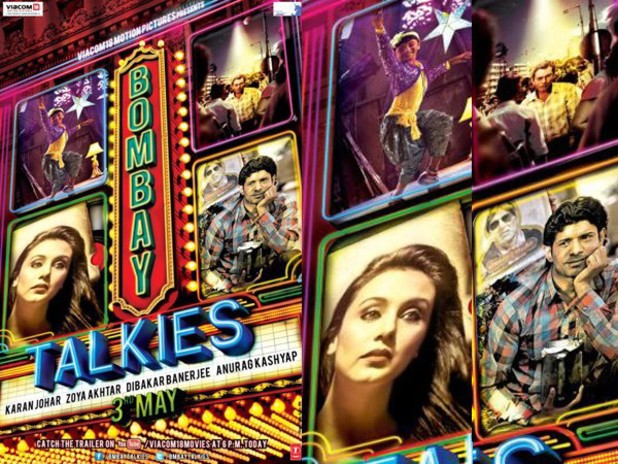



Bombay Talkies
Year: 2013
Directors: Karan Johar, Dibakar Banerjee, Zoya Akhtar, Anurag Kashyap
Cast: Randeep Hooda, Rani Mukherjee, Nawazuddin Siddiqui, Vineet Kumar Singh
Bombay Talkies…a movie celebrating 100 years of Indian cinema; a movie featuring 4 top contemporary film-makers’ independent shorts…The hype build-up was systematic and sustained.
The concept of multiple unconnected shorts in a film is not new in Bollywood. Films such as Darna Mana Hai (2003), Darna Zaroori Hai (2006) and Dus Kahaniyan (2007) have already used that structure quite successfully. The last two of these three were multi-directorial efforts as well.
Still the big names associated with Bombay talkies and the Indian cinema’s centenary-tribute theme, all ensured that there was a sizeable interest in the film. So how does the film express itself?
What’s the plot?
The film begins with a Karan Johar-directed short. It is a story about a rebellious, chirpy gay guy (Saqib Salim) and the emotional storm he unleashes in the lives of a high society journalist couple (Rani Mukherjee and Randeep Hooda).
The next short is directed by Dibakar Banerjee. Based on a short story by Satyajit Ray, this film is about a common man’s (Nawazuddin Siddiqi) accidental brush-off with a roadside film-shoot.
The third short is a Zoya Akhtar-effort and it tells a story of a small school-going boy dreaming to grow big and follow into Katrina Kaif’s footsteps to dance on the song Sheila Ki Jawani! To do that he would first have to take his elder sister into confidence and then surreptitiously go against his overbearing father, who is trying hard to make him a sportsman.
The fourth short comes from Anurag Kashyap. To fulfill his old father’s wish, a young son (Vineet Kumar Singh) comes from Allahabad to Mumbai and tries to meet Amitabh Bachchan. His mission? To make the superstar eat some Murabba (Mango in a sugar-syrup) and then, bring back the rest of the bottled sweets to his ailing father!
What’s hot?
· There are many top-notch performances. Rani Mukherjee, Nawazuddin Siddiqi, the two kids (playing siblings in Zoya’s film) and Vineet Kumar Singh are the standout performers.
· Dibakar Banerjee’s film succeeds in showing the sorry plight of small actors and the personal dreams that they have to sacrifice for the sake of their loved ones! Its climax- with some superb miming by Nawazuddin Siddiqui, is quite touching.
· Anurag Kashyap’s film is an insightful and largely funny take on fans going to any lengths to connect with movie-stars.
· The star-studded item-song at the end is exhilarating.
What’s not?
· While the rest of the films at least show a definite thematic core of Indian cinema’s influence on day-to day lives, Karan Johar’s film merely offers a cursory nod through mostly ineffective reprises of two Lata Mangeshkar-classic songs.
· Johar’s closet gay theme tries too hard to shock and awe with sensationalism.
· Banerjee’s film errs by making Siddiqui a Marathi man. The actor doesn’t get Marathi pronunciation right and that puts you off at times.
· Zoya Akhtar’s film on the cross-dressing boy-dancer looking up to Katrina Kaif as his guiding angel doesn’t really manage to stir the emotions.
· Kashyap’s film seems a tad stretched.
Verdict:
The cynical art-house treatment of Bombay Talkies is strictly for the classes visiting metro multiplexes. It is hard to see how this film can be considered a celebratory symbol for masses that really make Indian cinema what it is! The only sense of celebration comes right at the end, when the item-song Apna Bombay Talkies with its many star-singers and star-actors comes on screen.
But still the film is worth watching, just to make a quick comparative study of four contemporary film-makers and also to appreciate Indian cinema’s journey and evolution.